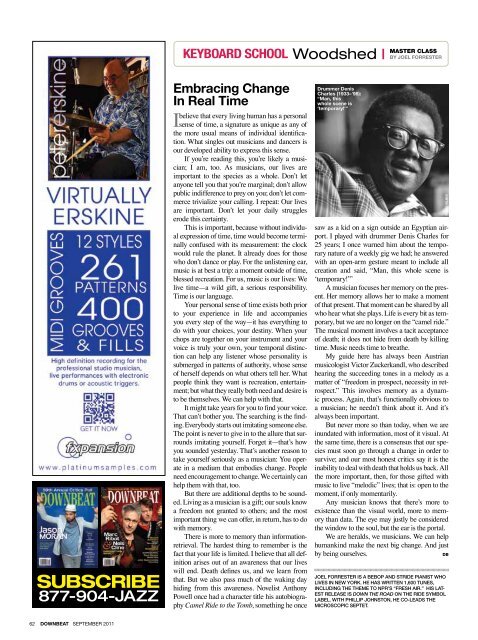You also want an ePaper? Increase the reach of your titles
YUMPU automatically turns print PDFs into web optimized ePapers that Google loves.
Master Class<br />
KEYBOARD SCHOOL Woodshed | By joel forrester<br />
Subscribe<br />
877-904-JAZZ<br />
Embracing Change<br />
In Real Time<br />
believe that every living human has a personal<br />
I sense of time, a signature as unique as any of<br />
the more usual means of individual identification.<br />
What singles out musicians and dancers is<br />
our developed ability to express this sense.<br />
If you’re reading this, you’re likely a musician;<br />
I am, too. As musicians, our lives are<br />
important to the species as a whole. Don’t let<br />
anyone tell you that you’re marginal; don’t allow<br />
public indifference to prey on you; don’t let commerce<br />
trivialize your calling. I repeat: Our lives<br />
are important. Don’t let your daily struggles<br />
erode this certainty.<br />
This is important, because without individual<br />
expression of time, time would become terminally<br />
confused with its measurement: the clock<br />
would rule the planet. It already does for those<br />
who don’t dance or play. For the unlistening ear,<br />
music is at best a trip: a moment outside of time,<br />
blessed recreation. For us, music is our lives: We<br />
live time—a wild gift, a serious responsibility.<br />
Time is our language.<br />
Your personal sense of time exists both prior<br />
to your experience in life and accompanies<br />
you every step of the way—it has everything to<br />
do with your choices, your destiny. When your<br />
chops are together on your instrument and your<br />
voice is truly your own, your temporal distinction<br />
can help any listener whose personality is<br />
submerged in patterns of authority, whose sense<br />
of herself depends on what others tell her. What<br />
people think they want is recreation, entertainment;<br />
but what they really both need and desire is<br />
to be themselves. We can help with that.<br />
It might take years for you to find your voice.<br />
That can’t bother you. The searching is the finding.<br />
Everybody starts out imitating someone else.<br />
The point is never to give in to the allure that surrounds<br />
imitating yourself. Forget it—that’s how<br />
you sounded yesterday. That’s another reason to<br />
take yourself seriously as a musician: You operate<br />
in a medium that embodies change. People<br />
need encouragement to change. We certainly can<br />
help them with that, too.<br />
But there are additional depths to be sounded.<br />
Living as a musician is a gift; our souls know<br />
a freedom not granted to others; and the most<br />
important thing we can offer, in return, has to do<br />
with memory.<br />
There is more to memory than informationretrieval.<br />
The hardest thing to remember is the<br />
fact that your life is limited. I believe that all definition<br />
arises out of an awareness that our lives<br />
will end. Death defines us, and we learn from<br />
that. But we also pass much of the waking day<br />
hiding from this awareness. Novelist Anthony<br />
Powell once had a character title his autobiography<br />
Camel Ride to the Tomb, something he once<br />
Drummer Denis<br />
Charles (1933–’98):<br />
“Man, this<br />
whole scene is<br />
‘temporary!’”<br />
saw as a kid on a sign outside an Egyptian airport.<br />
I played with drummer Denis Charles for<br />
25 years; I once warned him about the temporary<br />
nature of a weekly gig we had; he answered<br />
with an open-arm gesture meant to include all<br />
creation and said, “Man, this whole scene is<br />
‘temporary!’”<br />
A musician focuses her memory on the present.<br />
Her memory allows her to make a moment<br />
of that present. That moment can be shared by all<br />
who hear what she plays. Life is every bit as temporary,<br />
but we are no longer on the “camel ride.”<br />
The musical moment involves a tacit acceptance<br />
of death; it does not hide from death by killing<br />
time. Music needs time to breathe.<br />
My guide here has always been Austrian<br />
musicologist Victor Zuckerkandl, who described<br />
hearing the succeeding tones in a melody as a<br />
matter of “freedom in prospect, necessity in retrospect.”<br />
This involves memory as a dynamic<br />
process. Again, that’s functionally obvious to<br />
a musician; he needn’t think about it. And it’s<br />
always been important.<br />
But never more so than today, when we are<br />
inundated with information, most of it visual. At<br />
the same time, there is a consensus that our species<br />
must soon go through a change in order to<br />
survive; and our most honest critics say it is the<br />
inability to deal with death that holds us back. All<br />
the more important, then, for those gifted with<br />
music to live “melodic” lives; that is: open to the<br />
moment, if only momentarily.<br />
Any musician knows that there’s more to<br />
existence than the visual world, more to memory<br />
than data. The eye may justly be considered<br />
the window to the soul, but the ear is the portal.<br />
We are heralds, we musicians. We can help<br />
humankind make the next big change. And just<br />
by being ourselves. DB<br />
Joel Forrester is a bebop and stride pianist who<br />
lives in New York. He Has written 1,600 tunes,<br />
including the theme to NPR’s “Fresh Air.” His latest<br />
release is Down The Road on the Ride Symbol<br />
label. With Phillip Johnston, he co-leads the<br />
Microscopic Septet.<br />
Valerie Wilmer<br />
62 DOWNBEAT SEPTEMBER 2011
















